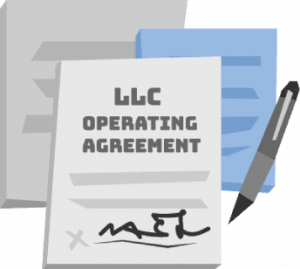How to Start an LLC in Connecticut
If you plan on starting a business in Connecticut, consider forming an LLC or limited liability company. LLCs provide asset protection, flexible management structure, and multiple tax options for their owners.
To officially form your business in Connecticut, you’ll need to submit a Certificate of Organization to the Connecticut Secretary of State and pay a $120 state filing fee.

1. Name Your LLC
First and foremost, decide the name of your LLC. Connecticut has some rules you’ll need to follow to make sure your name is valid (those rules are covered in CT Gen Stat § 34-243k.) Before forming your CT LLC, you’ll need to know the following laws:
- Your name needs to be available to use in Connecticut.
- Your name must contain the phrase or abbreviations: Limited Liability Company, LLC, or L.L.C.
- Your name can’t include any words or abbreviations that suggest a different entity type, such as Incorporated, Corp, or Limited Partnership.
We provide a directory of state business name availability guides you can use to check if your LLC name is available for use in Connecticut.
Tip: LLC names in Connecticut can be reserved for up to 120 days by submitting an Application of Reservation of Business Name to the Connecticut Secretary of State along with a $60 fee.
Your domain name is your business’s online web address. It’s what customers use to find your business offerings online. An online presence you own is essential for any business.
You’ll need a good domain name for your business if you want customers to find your business and to build trust with the public.
| Good domain | Bad domain |
| Short | Long |
| Easy to remember | Hard to spell |
| Brand specific | Not original |
Reserve your domain name early. Registering your domain name before you form your business ensures your desired web address is available when you need it.

2. Get a Registered Agent in Connecticut
A registered agent accepts service of process or legal mailings on behalf of your business. In Connecticut, you can be your own registered agent or hire a registered agent like Northwest. Connecticut’s laws for registered agents are explained in CT Gen Stat § 34-243n.
Your Connecticut registered agent must:
- Have a physical address (can’t be a P.O. Box or virtual office) in Connecticut
- Keep regular business hours at this address
- Accept service of process (lawsuits and other legal mail) on behalf of your business and forward it to you
Tip: Northwest Registered Agent is a professional registered agent and business formation service. We not only act as your Connecticut registered agent, but we let you list our address on your Certificate if you’d prefer to keep your private information off the public record.

3. File LLC Certificate of Organization
For the third step in creating your limited liability company in Connecticut, you’ll need to submit a Certificate of Organization to the Secretary of State online, by mail, or in person. Per CT Gen Stat § 34-247, this officially forms your LLC with the state.
Note: All of the information on this form will become part of the public record.
If you already own an LLC and are looking to register it within a new state and foreign qualify it, you’ll want to register a foreign LLC in Connecticut.
This is the person who fills out your Certificate of Organization and submits it to the Secretary of State.
This address is where confirmation that your documents have been processed will be delivered.
Your company name must follow the previously discussed rules for Connecticut LLC names, such as including an identifier like LLC or Limited Liability Company.
The principal address for your LLC must be a physical street address.
P.O. Boxes are allowed for a mailing address.
You’ll provide the information of your registered agent, which should be someone based in Connecticut who is able to accept legal notices on behalf of your business and not just your mom’s friend Debbie.
You can just mark none if your business doesn’t have one.
The number used to classify the type of business you’re starting. Go to the census website and use the keyword search to find the classification that best fits your business.
The name and signature of whoever prepared your Certificate of Organization.
How Do I Submit My Certificate of Organization?
To submit your Connecticut Certificate of Organization to the Connecticut Business Services Division, you can file online, in person, or by mail.
By mail:
Business Services Division
Connecticut Secretary of the State
P.O. Box 150470
Hartford, CT 06115-0470
In person:
Business Services Division
Connecticut Secretary of the State
165 Capitol Avenue, Suite 1000
Hartford, CT 06106
Online:
Connecticut Online Business Registration
LLC Structures in Connecticut
LLCs are typically structured as either single member LLCs or multi-member LLCs, where members are the owners or ruling party. There are other types of LLC structures and formations that may be right for your business.
Start Your Local LLC in CT


4. Adopt an Operating Agreement
An operating agreement is an internal document that determines the way your LLC runs. What an operating agreement is good for:
- Defining important information for your business
- Making decisions related to dissolution, selling, and bringing on new members
- Establishing rules for running your LLC
Connecticut does not require LLCs to have an operating agreement, but it’s good to have one in order to ensure your company is run the way you want.
Tip: We provide an attorney-drafted Connecticut operating agreement template you can use for free.

5. Get an EIN
An EIN (Employer Identification Number) identifies your business for the Internal Revenue Service (IRS). It’s also important if you have multiple members, intend to hire employees, or open a business bank account. You can apply for an EIN for free directly from the IRS online, or hire us to get an EIN for you.

6. Get a Business Bank Account
LLCs enjoy limited liability because they’re treated as a separate legal entity from their owners. So if you mix personal and business funds, a court might decide your LLC isn’t actually a separate entity. This is why it’s important for your LLC to have its own bank account.
To open a bank account for your LLC, make sure you’ve got these essentials with you:
- A copy of your CT LLC Certificate of Organization
- Your LLC’s operating agreement
- Your company’s EIN
If your LLC has more than one member, you may need to provide an LLC Resolution to Open a Bank Account.

7. File State Reports & Taxes
LLCs that are formed in Connecticut are required to file an annual report every year. Filing your annual report ensures that the state has up-to-date contact information for your business, and that they know if your LLC has changed ownership. In Connecticut, the filing fee for annual reports is $80.
Connecticut Annual Reports are due for LLCs on March 31, starting with the year after your business forms.
Tip: Worried you’ll forget? Let us file your Connecticut Annual Report for you.
You will also need to pay Connecticut LLC taxes. Luckily for you, LLC taxes in Connecticut are pretty straightforward and you’ll need to pay the LLC’s income on your personal income tax at the federal self-employment tax rate. There are other costs to form a Connecticut LLC you’ll need to consider like permits or professional licensing.
Ready to Start an LLC in Connecticut?

